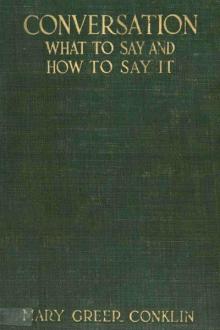Conversation
Conversation
What to Say and How to Say it
Those heretofore interested in agreeable speech will at once recognize my obligation to the few men and women who have written entertainingly on conversation, and from whom I have often quoted. My excuse for offering a new treatment is that I may perhaps have succeeded in bringing the subject more within the reach of the general public, and to have written more exhaustively. The deductions I have made are the result of an affectionate interest in my[11] subject and of notes taken during a period of many years. If the book affords readers one-half the pleasure and stimulus it has brought to me, my labors will be happily rewarded.
Book Excerpt
is not stringing anecdotes together; it is not inquisitive nor impertinent questioning. There are still other things which conversation is not: It is not cross-examining nor bullying; it is not over-emphatic, nor is it too insistent, nor doggedly domineering, talk. Nor is good conversation grumbling talk. No one can play to advantage the conversational game of toss and catch with a partner who is continually pelting him with grievances. It is out of the question to expect everybody, whether stranger or intimate, to choke in congenial sympathy with petty woes. The trivial and perverse annoyances of one's own life are compensating subjects for conversation only when they lead to a discussion of the phase of character or the fling of fate on which such-and-such incidents throw light, because the trend of the thought then encourages a tossing back of ideas.
Perhaps the most important thing which good conversation is not, is this: It is not talking for effect, or hedging. There are two kinds of hedging in c
Editor's choice
(view all)Popular books in Etiquette, Instructional, Philosophy
Readers reviews
0.0
LoginSign up
Be the first to review this book

 Free Download
Free Download






















